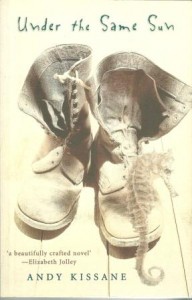Under the Same Sun
 Under the Same Sun is a novel about work and love. It is the story of two Italian men—Salvatore, a cook from Milano, and Fabio, a landless labourer from the Abruzzi — who both migrate to Australia in the early 1950s. It attempts what is rare in literature: to take as its subject the world of work and make it compelling and exciting reading. It moves from the kitchen of an Italian trattoria, to the furnaces of a Venetian glassblower, to a violent peasant occupation of an idle estate, to the dangerous work of drillers on the Snowy Mountains hydro-electric scheme.
Under the Same Sun is a novel about work and love. It is the story of two Italian men—Salvatore, a cook from Milano, and Fabio, a landless labourer from the Abruzzi — who both migrate to Australia in the early 1950s. It attempts what is rare in literature: to take as its subject the world of work and make it compelling and exciting reading. It moves from the kitchen of an Italian trattoria, to the furnaces of a Venetian glassblower, to a violent peasant occupation of an idle estate, to the dangerous work of drillers on the Snowy Mountains hydro-electric scheme.
It is also a novel about dangerous loves—a turbulent romance that develops amidst the canals and islands of Venice; an Australian girl who must defy her father to even meet the man she loves. Ultimately, the main characters of Under the Same Sun all hunger for a more fulfilling life. Their dreams may be embodied in another job, a lover, another country. But dreams are often illusory, and the answer may lie in the present, not the future, in the daily tasks of work, in staying put rather than moving away. It is a novel which redefines the aspirations that lie at the heart of contemporary Australians’ lives — for land, work and love. It explores the frightening yet exhilarating experience of migration and the satisfaction of finally finding a home.
It confronts the political issues of the time — the horrors of backyard abortion, the racism that existed at the birth of Australia’s multicultural society, the industrial negligence that can lead to a worker being trapped at the bottom of a mine shaft. Under the Same Sun is also a novel about a myriad of places — the walled medieval town of Minersole and the vast uncultivated estate below it; the canals, bridges and islands of Venice; and the claustrophobic life on the boat trip out to Australia. It recreates the deprivations of a migrant hostel in Matraville, the bustle of an expanding Cooma and the wind-swept tundra of the Australian high country. But it is not just the evocation of place that is important; this novel demonstrates how our experience of place affects our identity.
This book is written in radiant prose, by a writer with a poet’s ear for the rhythm of language and the ability to create an image that stays in your mind long after you finish reading. Like the best poetry, it takes you to the emotional core of a character’s life and the result is moving and powerful.
“Under the Same Sun is a beautifully crafted novel expressing the sense of loss and dislocation experienced by many migrants in Australia. A storehouse of living encircling the world.”
— Elizabeth Jolley
Reviews
“Certainly, every sentence in Under the Same Sun has been savoured word by word, and his prose is reminiscent of David Malouf, in books like Child’s Play and Remembering Babylon. …the book is made by Kissane’s language, sense of place and compassion for his characters.”
— David English, Sydney Morning Herald, October 7, 2000
“Under the Same Sun is a moving portrait of enduring mateship and the redemptive powers of love. As with the other novels, cross-cultural tension is dissected with a keen eye. Once again we are reminded of the dilemma of being caught between two worlds and therefore belonging wholly to neither.”
— Thuy On, The Age, August 6, 2000
“Readers will be moved by Kissane’s impressive prose debut. This often poignant story is a fine piece of historically based imaginative writing.”
— Christopher Bantick, Canberra Times, August 20, 2000
“Kissane writes in meticulous prose and anchors the narrative in concrete detail. The novel is in part a celebration of work and the working world; a young man squashes pungent garlic under the flat of a steel knife, a glass blower breathes into a ballooning iridescent sphere and a surgeon eases a wire through porous bone. … Under the Same Sun comes as a timely reminder of the importance of migration to Australia.”
— Miki Perkins, Australian Book Review, November 2000
“This beautifully written story…makes you ache with nostalgia for all immigrants…an important novel about our multicultural beginnings.”
—Australian Bookseller & Publisher
Buy now from:
Collected Works Bookshop, Telelphone: 03 9654 8873, Level 1, Nicholas Building, 37 Swanston Street, Melbourne, Victoria.
Fiction
Writing Workshops

